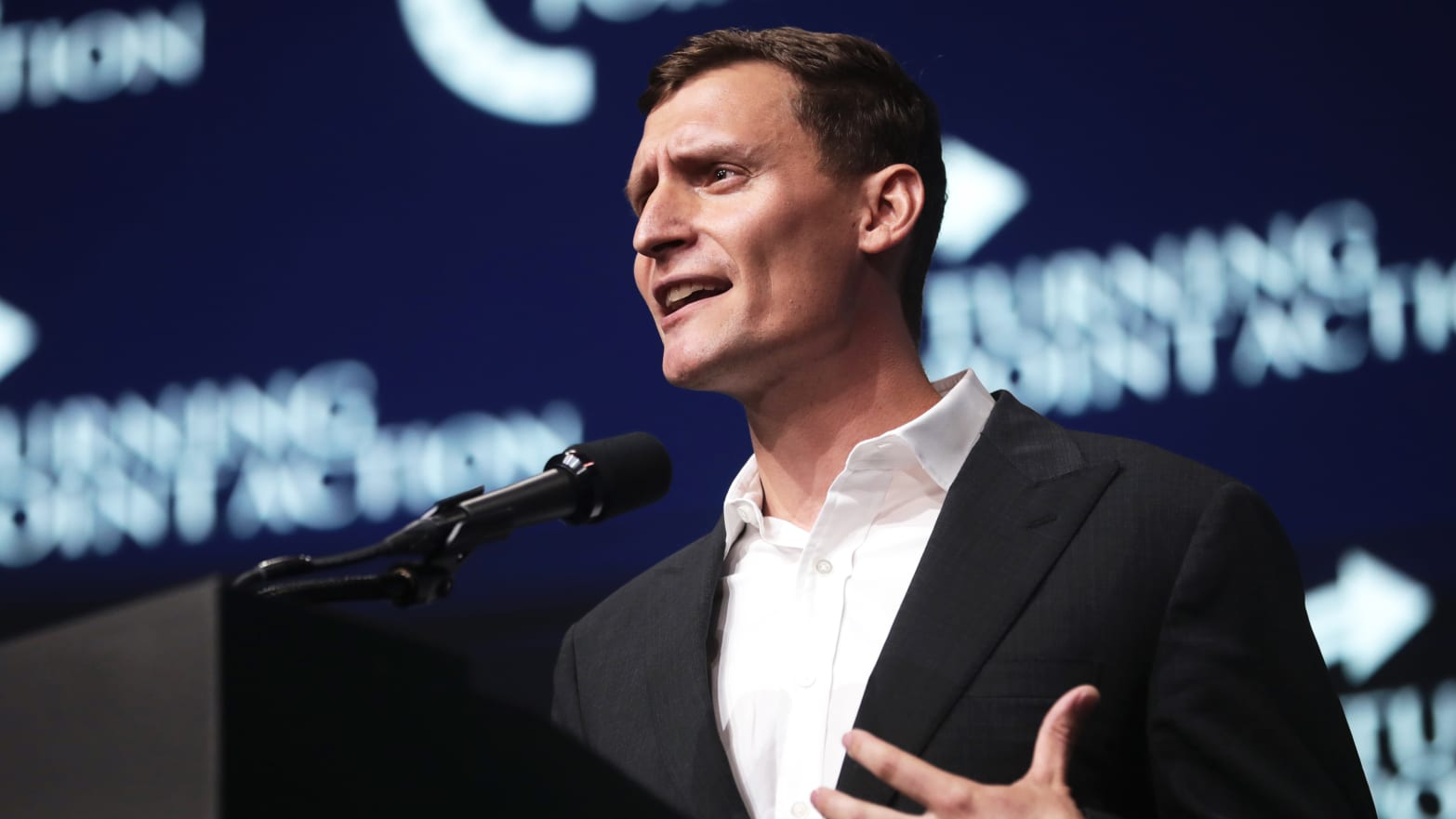Tech investor and Arizona Republican Senate hopeful Blake Masters acknowledges that the United States has a gun violence problem. But he also has a theory about why there’s a problem—it’s “Black people, frankly.”
Masters boiled the issue down in an April 11 interview on the Jeff Oravits Show podcast, telling the host that “we do have a gun violence problem in this country, and it’s gang violence.”
“It’s people in Chicago, St. Louis shooting each other. Very often, you know, Black people, frankly,” Masters clarified. “And the Democrats don’t want to do anything about that.”
It’s unclear why Masters—who has pushed the baseless “great replacement” conspiracy theory narrative—felt compelled to single out Black people. Moments earlier in the interview, during a discussion about Justice Ketanji Brown Jackson’s confirmation hearings, Masters told Oravits that “most Americans just, you know, just want to stop obsessing about race all the time,” adding that “the left’s biggest tool in their toolkit is just to divide people on the basis of race, and that’s really messed up.”
Republicans frequently cite urban gang violence, most often in Chicago, in attempts to tap out of the gun control debate. While their redirections are often as misleading as they are cliche, those officials aren’t always as forthright as Masters about the racial undertones.
But Masters, whom the white nationalist website VDARE fêted last year as an “immigration patriot,” was quite clear about his vision of two Americas.
After pinning gun violence on gangs and Black people—and saying, falsely, that Democratic administrations “don’t want to do anything” about gang shootings—the Stanford-educated libertarian went on to complain to Oravits that gun control efforts target “law-abiding people like you and me.”
“When they ban ‘ghost guns’ and pistol braces, that’s all about disarming law-abiding people, like you and me, that’s what it’s about,” Masters said, referencing government efforts to crack down on the surge in privately made, untraceable firearms. “They care that we can’t have guns to defend ourselves.”
Masters—a Bitcoin evangelist who routinely hawks automated surveillance technology developed by his benefactor, billionaire tech mogul Peter Thiel—claimed that “it’s pretty rare” for homemade firearms to show up in criminal activity. But his information might be outdated.
Ghost guns aren’t just built and owned by technocrats, to be appreciated as physical manifestations of political theory. They’re also on the rise among criminals, including in gang activity, according to officials with the Bureau of Alcohol, Tobacco, and Firearms, as well as fresh police data VICE published this week, which documents a 90 percent increase in seizures last year.
On the day of the Oravits interview, President Joe Biden announced a rule change to address the ghost gun problem. In response, Masters tweeted a photo of his own “ghost” gun kit, claiming that he would be a “felon” under the new rule if he made “another one just like it today.”
That’s not accurate. The Biden administration has not banned those weapons, which don’t have serial numbers and can be 3D-printed at home. The new rule doesn’t make it illegal to build your own gun; it applies to people who sell gun kits. Those sellers are now required to become licensed firearms dealers, run background checks on buyers, and include serial numbers on their kits.
The rule also targets violence in urban areas—a sore point for Masters—where ghost guns are multiplying.
Last year, police seized more than 225 of the weapons in New York City, along with 300 seizures in Baltimore and 455 in Chicago, CBS News reported. And government data shows that law enforcement agencies reported recovering 20,000 suspected ghost guns in criminal investigations last year alone—nearly as many seized over the previous four years combined.
A Masters campaign spokesperson did not reply to a request for comment.
Back in the interview, Masters—who has likened federal campaign disclosure laws to Kristallnacht—veered into conspiratorial territory.
Democrats “don’t like the Second Amendment,” he said, because “it frankly blocks a lot of their plans for us”—an unhinged, fact-free statement that liberal officials have cooked up a plot to physically force conservatives to comply with some unarticulated evil regime, but have been held at bay by fears that a constitutionally endowed populace will shoot them if they try.
Masters also tossed out misleading red meat gripes about crime in West Coast cities Los Angeles and San Francisco, where Masters lived much of his adult life before relocating to Arizona ahead of his Senate bid.
Those cities, he told Oravits, have “legalized crime,” claiming that “you can’t get arrested if you smash someone’s window and take a purse or an iPhone.”
It’s not immediately clear what Masters was referring to, but the riff appears to be a nod at Prop 47, which California voters passed at the state (not city) level nearly eight years ago. The Prop 47 coalition included Democrats along with libertarians like Masters, who wanted to roll back felony punishment for lesser offenses, including property crimes like shoplifting.
Prop 47 didn’t “legalize crime,” but reclassified certain felonies as misdemeanors. But after the recent rise in property crimes such as “smash and grab” robberies, most Californians support tougher sentencing laws, including overhauling parts of Prop 47.
“They talk about crime but I find it crocodile tears,” Masters said, an apparent reference to Democratic outrage over an unending drumroll of domestic massacres. “Because if they were actually tough on crime they would get serious about gang violence.” (Masters himself did not put forward a solution to gang violence in the interview.)
Masters, 35, is a fairly new name in GOP politics, but he has benefited from powerful friends—including his mentor, Thiel, who threw $10 million into a super PAC backing his primary bid.
Thiel’s support went a long way to landing a recent endorsement from former President Donald Trump, who officially blessed Masters on Thursday. It wasn’t a surprise—Trump has a score to settle with Masters’ top opponent, Arizona attorney general Mark Brnovich, who resisted Trump’s pressure to invalidate his state’s 2020 election results.
But Masters isn’t MAGA, exactly. He’s more MAGA-adjacent, part of a loosely affiliated group of young, very online hyper-conservatives known as the “new right.”
Masters is fiercely anti-tech while being fiercely pro-tech, backs a national abortion ban, claims Democrats want to “import a million people every year to replace Americans who were born here,” has said that the media and big tech “conspired to manipulate the 2020 election”—which he claims “Trump won”—and calls the gender pay gap a “left-wing narrative.”
(The “new right” crowd also counts another Trump-endorsed Thiel protege: Ohio Senate candidate J.D. Vance.)
Masters won Trump’s endorsement nine days after an 18-year-old used a legally purchased semiautomatic rifle to slaughter 19 elementary school students and two teachers in Uvalde, Texas.
“Blake will fight for our totally under-siege Second Amendment, and WIN!” Trump wrote in his announcement. An hour later, Biden called on the country to support an array of gun control measures in a primetime national address.

